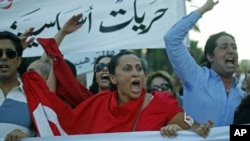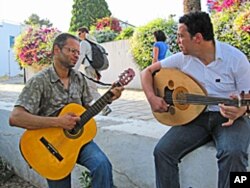The North African country of Tunisia was to have held its first ever democratic elections this month. The vote has been delayed until October, as authorities finalize a process that experts hope may become a prototype for future Arab democracies. But from the capital Tunis, where this correspondent recently visited for VOA, Tunisians are bewildered by a wide open political playing field.
The sounds of Tunisia's Jasmine Revolution have faded. Instead of clashing with riot police, young men and a few woman gather in sidewalk cafes in the capital Tunis on summer evenings, drinking tea and puffing on water pipes.
There remain some reminders of January 14 - the day when a massive, popular uprising ousted Tunisia's long-time leader Zine el-Abidine Ben Ali - like the tanks and barbed wire flanking the interior ministry on the main Habib Bourguiba Boulevard.
Moving past Ben Ali
Two trials in Tunis already have sentenced Ben Ali in absentia to a total of 50 years in prison on charges ranging from drug smuggling to embezzlement. Government efforts to extradite him from Saudi Arabia so far have failed.
But today, this North African country is looking ahead to its first-ever democratic elections, scheduled for October 23.
More than 90 parties are running for a seat in the so-called Constituent Assembly, tasked to draft a new constitution and set parliamentary and presidential elections. One of them is the tiny Popular Unity Party, or PUP - located next to a dentist's office on the second floor of a shabby apartment building.
Many parties vying for position
Secretary General Hassine Hammami describes PUP's platform. The party favors a secular government, press freedom and a Socialist economy.
But Hammami said he also is worried about where Tunisia is heading. Just how much power will the new Constituent Assembly have, and how long will it last?
Hammami isn't the only one with questions. University student Sami Ben Jaafar, strolling downtown with his girlfriend on a recent afternoon, said Tunisians don't know what's going on.
Information gap as election looms
Jaafar said there's a huge lack of information about the many political parties and platforms... and the election is just over three months away.
In fact, more than half of all Tunisians have no idea about any of the parties vying for a place in the assembly. That's according to a survey by local polling agency ISTIS. General Director Hosni Nemsia said the ISTIS poll also shows Tunisians are interested in politics. After years of stifling, one-party rule, they want to be involved in shaping the country's future. Suddenly everybody wants a voice.
In the seaside suburb of Sidi Bou Said, Thabet Graia and Talel Aleli are expressing themselves through their music.
Graia said their folk group Echola - or flame in Arabic - sings about liberty and political injustice. Tunisia has had a political revolution, he said, and now it's time for a cultural one.
Secular vs. political Islam
The party that has captured national attention, and some concern, is the moderate Islamist Ennahda. Banned for two decades under Ben Ali, the party is now legal, with two gleaming new offices in Tunis. Senior members like Zied Daouetli, who spent 14 years in prison under Ben Ali, now juggle public meetings and interviews with reporters.
Daouetli said Ennahda's role model is Turkey under the country's popular Islamist prime minister Recep Tayyip Erdogan.
But the role of political Islam is deepening tensions in a country that has long championed women's rights and opted for secular, western-style politics.
Last week, hundreds of people demonstrated in Tunis and the southern city of Sousse to denounce the rise of Islamism. The rallies came after members of a banned Salafist Muslim party attacked a cinema showing movie called "No God, No Master."
Twenty-year-old Mahmoud Abdellewi, who works in a tourist store in Tunis' old medina, said the one party he won't vote for in October is Ennahda.
"Because I hate it. They did many things bad in the beginning, from many years ago," he said.
But many Tunisians like Ennahda - including those who aren't very religious. One of the party's biggest strengths, said Paris-based analyst Mansouria Mokhefi, is that it's perceived as untarnished by the years of political corruption under Ben Ali.
Many choices amid uncertainty
Mokhefi, Middle East and North Africa program director at the French Institute of International Relations, said whether Ennahda is as moderate as it appears remains to be seen. But democracy will give Tunisians a choice. If don't like the party, she said, they can vote it out of power.
Despite the political uncertainty - and scattered pockets of fitful violence - many people in Tunisia are hopeful about the future.
Mokhtar Trifi, president of the Tunisian Human Rights League, believes the country is experiencing the natural growing pains of any new democracy.
Trifi said that after years of a ferocious dictatorship, Tunisians are getting used to political life and freewheeling debate. The dizzying array of political parties is just one way they are expressing themselves.
Where is Tunisia going? Nobody is quite sure. But all the indications, analyst Mokhefi said, are pointing in the right direction.





